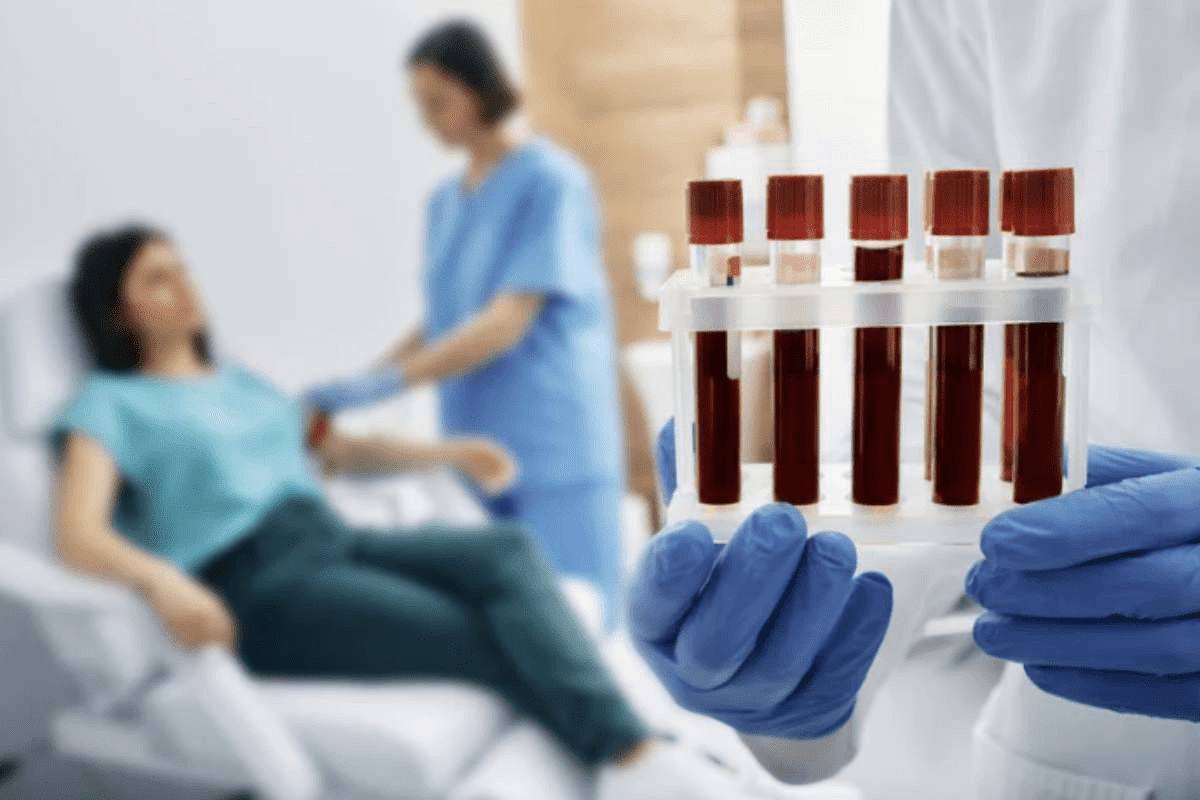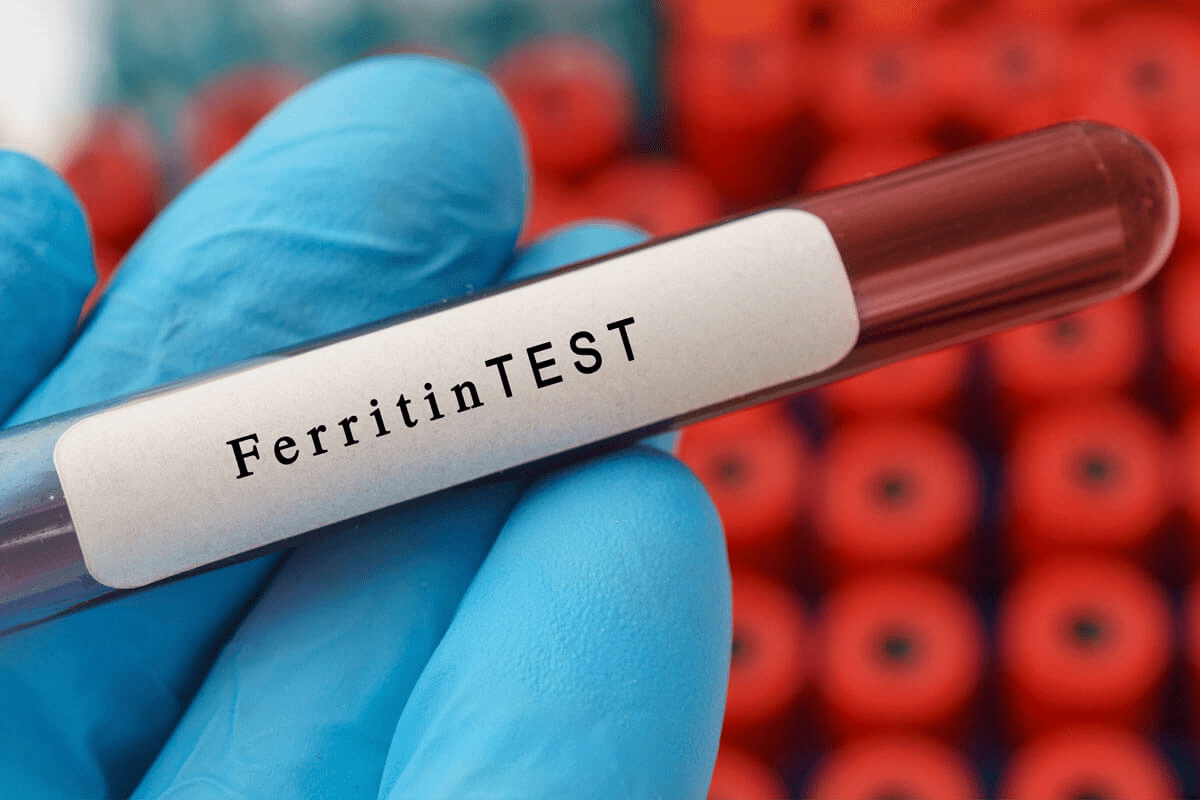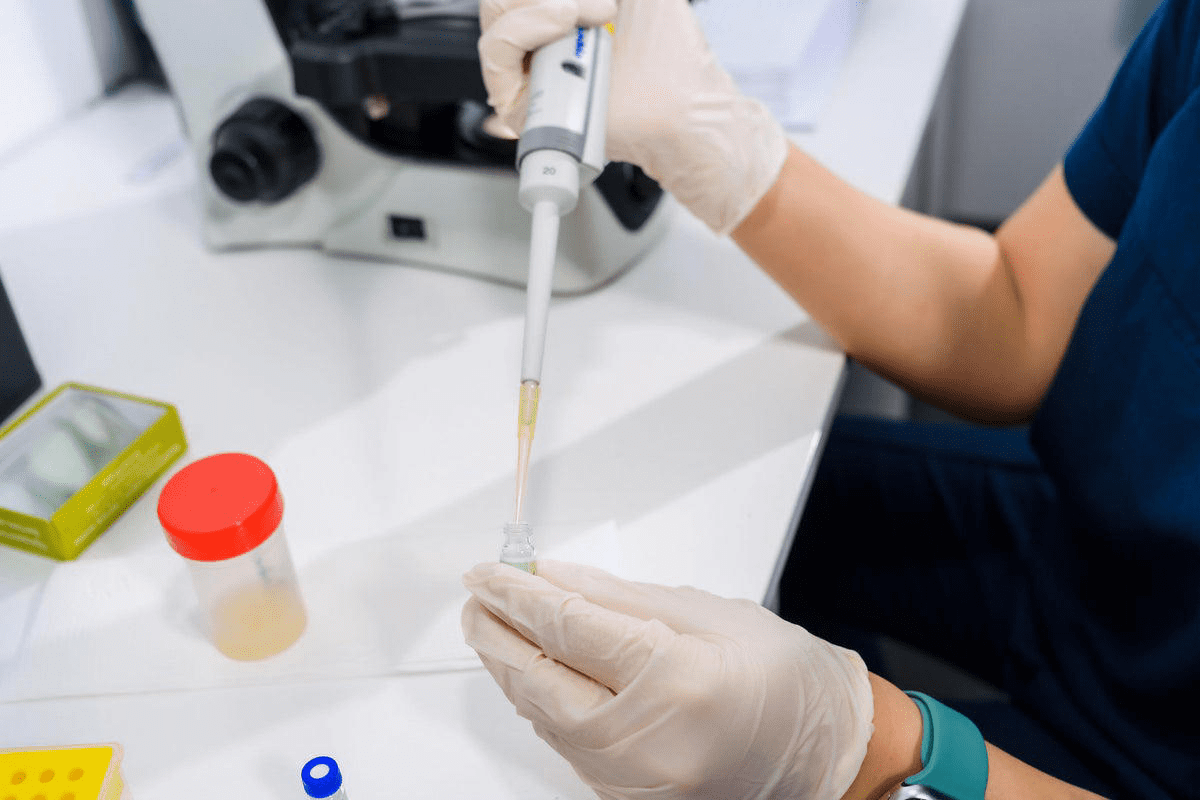Last Updated on November 27, 2025 by Ilayda Cengizhan
Understanding fertility blood tests in IVF can feel overwhelming. But these tests also known as IVF Blood Work are key to your fertility journey. At Liv Hospital, we focus on you with precise, timely blood work protocols. These help you on your path to success.
Before and during IVF, different IVF Blood Work and IVF blood tests are done. They check your fertility and guide treatment choices. These tests give insights into your reproductive health and hormone levels. They help doctors create treatment plans just for you.


For those starting IVF, knowing about IVF Blood Work is crucial. These tests check hormone levels, ovarian reserve, and fertility health. They help doctors make the best treatment plans.
Blood tests like IVF Blood Work check follicle-stimulating hormone (FSH) and estradiol levels. These results indicate egg quality and ovarian reserve. Using IVF Blood Work, doctors can tailor your stimulation and medication to your needs.
Hormones are very important for IVF success. Blood tests check hormones like FSH, estradiol, and luteinizing hormone (LH). The right balance of these hormones is key for:
Hormone | Role in IVF | Significance |
FSH | Stimulates follicle growth | Indicates ovarian reserve |
Estradiol | Reflects follicle development | Helps in timing egg retrieval |
LH | Triggers ovulation | Monitors response to medication |
By watching these hormone levels, doctors can adjust your treatment. This helps increase your chances of success. Knowing how hormones affect IVF helps patients make better choices during treatment.
Before starting IVF, you’ll have several blood tests collectively called IVF Blood Work. These tests assess fertility and overall health, guiding your doctor to plan the most effective treatment.
These are core components of IVF Blood Work, providing critical insight into ovarian function.
Hormone | Normal Range | Significance |
FSH | 1-10 IU/L | Indicates ovarian reserve |
AMH | 1-5 ng/mL | Reflects egg reserve |
Estradiol | 20-400 pg/mL | Affects embryo implantation |

Genetic carrier screening checks for genetic disorders you might pass to your kids. It’s a blood test for genes linked to certain conditions. Knowing your genetic status helps you and your partner make informed choices about IVF.
Genetic carrier screening is recommended for those with a family history of genetic disorders or certain ethnic backgrounds.
Infectious disease testing is key before IVF. Clinics check for Hepatitis B, Hepatitis C, HIV, and more. These tests make sure you’re healthy before starting IVF, lowering the risk of problems.
Understanding these test results helps you and your doctor create a treatment plan just for you. This plan aims to increase your chances of success with IVF.
Day 2–3 tests form the foundation of IVF Blood Work. They help assess ovarian reserve and hormone balance, guiding proper stimulation protocols.
These tests are essential components of IVF Blood Work that determine how your treatment will be tailored.
FSH and estradiol tests check your ovarian reserve. High FSH levels might mean fewer eggs. Estradiol levels show how your hormones are balancing. These tests together help us understand your ovaries better.
Here’s how FSH and estradiol levels are interpreted:
Hormone | Normal Range | Interpretation |
FSH | 1.4 – 9.5 IU/L | Lower levels indicate better ovarian reserve |
Estradiol | 15 – 350 pg/mL | Levels vary by cycle day; helps assess hormonal balance |
Anti-Müllerian Hormone (AMH) testing shows how many eggs you might have. AMH can be tested at any time, unlike FSH and estradiol. It’s a key indicator of how well your ovaries are doing and how likely IVF will work.
These blood test results help us make your IVF plan just right for you. We use them to adjust how much medicine you get and how we stimulate your ovaries. This way, we can increase your chances of success.
If your AMH is low, we might change how we stimulate your ovaries to get more eggs. FSH and estradiol levels also guide us in making your treatment plan the best it can be.
To make sure your IVF treatment works, we do a suppression check. This blood test checks if your ovaries are ready for stimulation. It happens about 10 days after you start taking suppression medication.
The suppression check is a key part of your IVF journey. We do it about 10 days after starting suppression medication. This lets us see if your ovaries are ready for the next step.
Proper downregulation is key for IVF success. It means your ovaries are not making eggs too early. And they’re ready to respond to the stimulation medication.
A “properly downregulated” state means your hormone levels are just right. This shows your ovaries are ready for stimulation. Your estradiol levels should be low, and you shouldn’t be ovulating yet.
Your suppression check results will tell us what to do next. If your hormone levels are good, we’ll start the stimulation phase. But if they’re not right, we might change your medication or wait a bit.
Result | Interpretation | Next Steps |
Properly Downregulated | Hormone levels within desired range | Proceed with Stimulation |
Not Downregulated | Hormone levels not within desired range | Adjust Medication or Delay Stimulation |
Knowing your suppression check results is important for your IVF treatment. We’ll talk about them with you and decide the best next steps for you.
During the IVF process, blood work is key. It helps doctors adjust treatment plans. This phase is all about watching hormone levels and follicle growth closely.
We test blood every one to two days during this phase. This starts from day 5 and goes until the trigger shot is given.
Monitoring Schedule:
Day of Stimulation | Test Frequency | Primary Hormones Monitored |
5-7 | Every 1-2 days | Estardiol, LH, Progesterone |
8-10 | Every day | Estardiol, LH |
Trigger Shot | As needed | Progesterone, Estardiol |
We watch estradiol levels to see how follicles are growing. We also track LH and progesterone. This is to keep them in the right range for IVF success.
Your blood test results might lead to changes in your medication. We might adjust the dosage or type to help your follicles grow and hormone levels stay right.
By keeping a close eye on your progress and making changes, we aim for the best IVF outcome for you.
After the trigger shot, we closely watch the patient to find the best time for egg retrieval. This step is key for the egg retrieval’s success.
Egg retrieval is set for 35 to 36 hours after the trigger shot. This timing is chosen to match when the eggs are ready. It’s important to get the eggs when they’re mature but before they’re released.
We use blood tests to check hormone levels, like LH (luteinizing hormone) and progesterone. These tests help us know if the eggs are ready and if ovulation has started. By watching these hormones, we can adjust the egg retrieval timing to improve success chances.
Off-timing egg retrieval can harm the procedure’s outcome. If it’s too early, the eggs might not be mature. If it’s too late, ovulation might have happened. Either way, it can lower the number and quality of eggs, affecting IVF success.
By monitoring the patient’s condition and hormone levels after the trigger shot, we aim for the best egg retrieval timing. This helps increase the chances of a successful IVF outcome.
After embryo transfer, IVF Blood Work includes beta hCG, progesterone, and estradiol monitoring. These tests ensure early pregnancy is developing normally and help guide further care.
The beta hCG test is a must after embryo transfer. It checks for pregnancy and tracks its growth. It looks at human chorionic gonadotropin (hCG) levels in the blood, a hormone the embryo makes after implanting. The first test is usually around 9-11 days after the transfer.
How often you get this test can change. Some places do it once, others more often to watch hCG levels rise.
Progesterone and estradiol levels are also watched early on. Progesterone keeps the pregnancy going, and its levels are checked. Estradiol is important for the health of the pregnancy.
These hormone levels show if the pregnancy is going well. They help doctors see if they need to change the treatment plan.
Beta hCG levels doubling every 48 hours is normal early on. But, this can differ from person to person.
Knowing about beta doubling times helps doctors check if the pregnancy is healthy. If doubling times are off, it might mean there’s a problem that needs looking into.
Hormone | Role in Pregnancy | Typical Levels |
Beta hCG | Indicates pregnancy and monitors progression | Varied, typically increasing |
Progesterone | Maintains pregnancy | Adequate levels vary by individual |
Estradiol | Assesses health of pregnancy | Varied, monitored for optimal range |
By watching these hormone levels closely, we can help support a healthy pregnancy after IVF.
Understanding IVF Blood Work results allows patients and doctors to make informed decisions. Key hormones like FSH, AMH, estradiol, and progesterone are evaluated for optimal IVF outcomes.
Doctors also watch for red flags in IVF Blood Work, such as:
It’s important to know the difference between normal and optimal ranges in your IVF blood work. Normal ranges are what most labs use and show average values for many people. But, the best ranges for IVF success might be different. Your fertility specialist will look at your specific situation and treatment to decide on these ranges.
For example, estradiol and progesterone levels are very important during IVF. While normal ranges are wide, the best ranges for these hormones during IVF are more specific. Your doctor will use this information to understand your results better.
Your doctor will look closely at your IVF blood work for any red flags. These could be:
Finding these red flags early helps your fertility specialist adjust your treatment. This can improve your chances of success and reduce risks.
It’s important to ask questions about your IVF blood work results. Some key questions include:
By understanding your IVF blood work results and asking the right questions, you can make informed decisions. This helps you work closely with your healthcare provider to achieve the best outcome.
Timely blood testing is key to a successful IVF journey. It helps understand the different blood tests and their roles at each stage. This knowledge lets individuals better manage their IVF treatment.
IVF blood tests are vital for checking fertility, tracking hormone levels, and finding the best time for egg retrieval and embryo transfer. This monitoring helps doctors adjust treatments for better results.
Success in IVF depends on careful planning, precise monitoring, and timely actions. IVF blood tests and fertility blood tests offer valuable insights. They help individuals make informed choices and improve their chances of success.
Knowing the value of these tests and working with healthcare providers is essential. This way, individuals can confidently move through their IVF journey. They can make the most of the latest in fertility care.
Baseline blood tests are done on days 2-3 of your cycle. They check hormone levels like FSH and estradiol. This helps decide the best treatment plan.
A suppression check is a blood test 10 days after starting medication. It checks if the ovaries are downregulated correctly. This ensures the treatment is on the right path.
Blood tests are done every one to two days during stimulation. They start from day 5. This is to watch hormone levels and adjust medication if needed.
The beta hCG test confirms pregnancy and tracks its growth after embryo transfer. It’s key for knowing the health and viability of the pregnancy.
Yes, some blood tests, like baseline blood work, can be done on the 2nd or 3rd day of your cycle. It’s common in IVF treatment.
Fertility specialists use IVF blood test results to check hormone levels and ovarian reserve. They tailor treatment to each patient’s needs. This improves IVF success chances.
AMH testing shows the egg supply. It helps fertility specialists choose the right treatment and medication doses for IVF.
Egg retrieval timing is key. It’s usually 35 to 36 hours after the trigger shot. Any timing change can affect the procedure’s success.
Progesterone and estradiol levels are checked through blood tests after embryo transfer. This ensures the pregnancy is developing well and is healthy.
Fertility specialists look for specific markers and red flags in IVF blood work results. They interpret these in the context of what’s normal and optimal for success.
Subscribe to our e-newsletter to stay informed about the latest innovations in the world of health and exclusive offers!